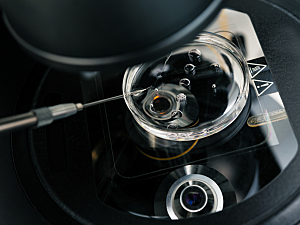Globozoospermia, a rare cause of male factor infertility, is diagnosed when all or some of a man’s spermatozoa have rounded heads, lacking the acrosomes (cap-like structures) that allow them to penetrate an oocyte. Intracytoplasmic sperm injection sometimes allows couples affected by globozoospermia to conceive, and the introduction of artificial oocyte activation agents have increased birth rates even more.
The World Health Organization calls on in vitro fertilization (IVF) and andrology laboratories to identify structural defects in spermatozoa. However, researchers at Brigham and Women’s Hospital have identified a gap between the ability of U.S. laboratories to recognize globozoospermia and the extent to which they report it to the ordering clinician. Martin Kathrins, MD, associate surgeon in the Division of Urology at the Brigham, medical student John Ernandez, urology resident Catherine Gu, MD, published their findings in Andrologia.
Methods
The researchers emailed a nine-question survey to 490 IVF and andrology clinic laboratory directors in the U.S. who were listed by either the Society for Assisted Reproductive Technology or the American Society for Reproductive Medicine.
51 directors (10%) responded, representing every region of the country. 67% were affiliated with private practices, and the others were employed by an academic institution.
Key Results
Answers to key survey questions suggested that while laboratories can recognize globozoospermia, they are less likely to report suspicion of globozoospermia as their own finding or report on the percentage of acrosome-deficient sperm:
- Do you believe the lab technicians who analyze the semen samples for your IVF clinic know the condition known as globozoospermia? Yes, 86%; No, 14%
- Do you believe the lab technicians who analyze the semen samples for your IVF clinic can identify a semen sample as having globozoospermia? Yes, 94%; No, 6%
- Is there a space in the semen analysis report to notify the ordering clinician of concern about globozoospermia? Yes, 49%; No, 27%; Other, 24% (10 respondents said they reported in a comment/remarks/additional findings section, one said they didn’t notify the ordering clinician, and one said they reported a percentage of abnormal sperm without a breakdown of abnormalities)
- Do you feel your clinic can identify patients with a concern for globozoospermia? Yes, 76%; No, 24%
- Does your lab report the percent of acrosome-deficient sperm? Yes, 16%; No, 84%
Barriers to Appropriate Care
These findings indicate clinicians are not always being empowered to make a diagnosis of globozoospermia. Recognition of this disorder is essential to discussing ceasing attempts at normal conception and proceeding to assisted reproductive services.
